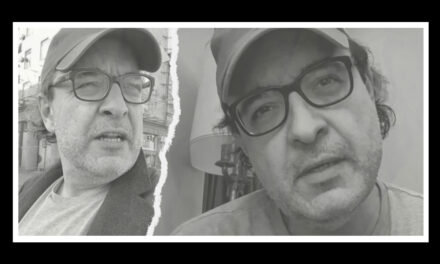Wading into the common field again and again with dingy boots - that's not what peasants do. But you, dear Péter Geszti.
"I am not one of those who can say meaningful things about Péter Geszti. It is certain that Aladár Mézga spoke in his voice. Rémlik also has a song, but its music was partly written by LGT, and anyway, when Geszti discovered the rapper in himself, his self-realization - pain - did not get enough attention. It's a fact that Geszti still has fans, either because they live or die for the painfully screeching rhymes, or for something else - it doesn't matter, Geszti is just an excuse for this article, it doesn't matter, what he doesn't understand at the moment," writes Hungarian in Nemzet , about which Péter Geszti rubbed his feet against Attila Pataky and portrayed the Hungarians in a Facebook post published this week.
"Today's article is about Hungarian translation. About the inner urge that sometimes you have to say something extremely humorous about national relics, symbols, successes, memories, figures. The tone of this speech is always sarcastic, of course afterwards, when the victims are outraged, the insulters skillfully deny that they provoked them.
No, no, they only lived by the free expression of opinion, anyway, everything that doesn't hurt others is free, but what hurts the national side doesn't exist, doesn't it - that's what liberals are all about.
In Budapest, the silly peasant has appeared on the cabaret stage for many generations,
who comes from the countryside, isn't he, stupid as a pumpkin, speaks in dialect, wears a hat (look it up, what is that...), besides, he's a prejudiced bastard who only knows how to plow and sow, he's so unlucky.
Not like the enlightened viewers and listeners, who see through the sieve and laugh to tears at the fact that the peasant came to Pest and doesn't know where the tram is going.
At the turn of the century, a host of Orpheum stars joined this noble cabaret tradition, and then of course Hofi too, especially after 1990, when it was no longer funny or original, and after the regime change, we were literally flooded with disgraceful productions.
This was joined by Péter Geszti, who went after the Hungarian memory with a premeditated intention, making fun of the Gesta Hungarorum as well as Szent István or the conquest.
Since the regime change, the two political sides have been cultivating that one offends, the other offends back, then there is no agreement, the caravan moves on. However, as a rural, Hungarian, Christian person, you have already received enough to call yourself trained.
Yet: so much water has already flowed down the Danube that the latest left-wing provocations do not even touch our sense of self. We wrote this article not to reject Geszti's brainstorming (after all, everyone only gives as much as they can), but to guide him in his main mistake.
The truth is the following: Hungary has two-thirds again and again because, according to the majority, you simply cannot choose from the public and cultural offer. The future of the state cannot be entrusted to those who have problems with the state itself. Those who do not work to make people proud of their country, their communities, their faith, their past and most of all themselves.
Such a person is forever an outsider, and the majority of voters know and feel that you do not have a national minimum. As long as the domestic left does not change this attitude, it will be in the minority. Our lives are not only about national symbols and Hungarian unity, I admit, but wading into the common field again and again with cloying boots is not what peasants do. But you, dear Péter Geszti.
And let us say it again: in 2024, this is very little, it is completely useless to pretend that we are in 1990. And one more thing: do you know that anti-Hungarianism is also disgraceful chauvinism? I thought I would speak.” - writes László Zöldi Szentesi in his publicism.

Photo: Péter Geszti Facebook
Facebook post mocking Attilán Pataky and Hungarian history without any changes :
"I am reading the memoirs of my industry colleague, Attila Pataky, according to which he was born sixty-three thousand years ago during the Paleolithic, lived several lives, visited his own grave, and is often taken by UFOs. I envy these busy lives, but I draw your attention to the fact that I not only "Dreamed a world for myself", but I can also provide physical evidence regarding my previous lives and parallel realities - see the attached picture!
To this day, I remember well, for example, the conquest of the country, when it was made. Around five in the afternoon we rode in with my tribe - at Verecké. It was tight. That is, the competition with the other tribes as to who will then reserve a plot of land for themselves. Even then, real estate was a big business, especially in the interior, with a deer and utilities. In addition to the Nyék, Megyer, Keszi, Gyarmat, Tarján, Kér, Jenő, and Kabar tribes, we also got some Gyepü, Lapu, and Gongyola. As is well known, the name of the Geszt settlement still bears the memory of the Geszt tribe. I would like to note that the gesture is the most valuable part of the wood, almost as hard as the honest rakenroll. It is located between the girdle and the intestine, and its material is made up of dead cells of the tree. Its lifespan is roughly ten times that of the belt, and it is an excellent material for soul migration.
As far as the facts are concerned, it is well known that Anonymus created his historical work based on our descriptions under the title "The things the Magyars wore" - Geszti Hungarorum, although I suggested another title that could be sung better. It said (would have): All the best, Scythia! Anyway, in the picture behind me, my good brother, Àlmos, can be seen right now, and no one could soften the meat under the saddle better than him. This would have come in very handy later during the Tartar invasion, because the Tartars did not give food to anyone. Would Mongols be Scots?
Well, back to the beautiful spring afternoon of 895! My younger brother and I had a good time in the beginning, we introduced the dual principality along the way, I became the cloth, he the gyula. In other words, he dealt with military affairs and overheads, and I dealt with propaganda, which we dressed up in the caftan of sacredness, and when we rode out into the wilderness, the Pagany Induló always said. It wasn't cheap entertainment, especially the fireworks, but the people loved it, so they didn't mind that the wealth looted during the adventures later lost the character of regular money. The good old days! Only after that Géza, Pista and the Christians came and spoiled the party. I thought it better to go illegal, because there was a lot on my runic writing, and my younger brother explained to Koppány, but then he lost his head. And his hand. And his legs. Well, that's all for today about the legendary house parties, Attila! I will bring the rest of the evidence soon at the Geszti Sixty Aréna concert in January."













